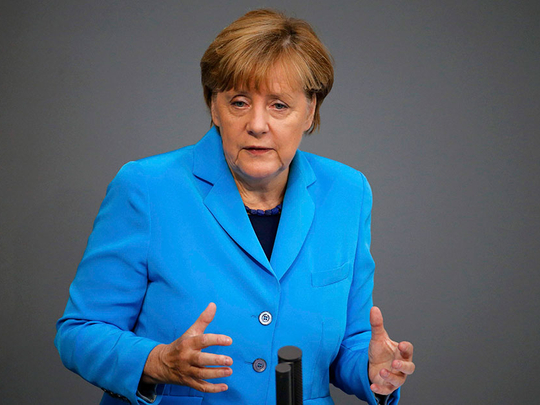
Angela Merkel, the German Chancellor, is right that the current refugee crisis is forcing Europe to consider whether it can live up to its own, self-proclaimed values. Unfortunately, the answer is likely to be “No”.
For almost 500 years, European nations dominated, colonised and populated the rest of the world. After 1945, the states of western Europe signed up to a new post-imperial and post-fascist set of values, based on universal human rights and enshrined in documents such as the 1951 United Nations Convention on refugees.
But the desperate and dispossessed of the world were largely kept at a distance, while Europeans continued to enjoy some of the highest living standards in the world. Faced with distressing images of famines or wars in the “third world”, Europeans could salve their consciences by making a donation to charity or attending a benefit concert.
Now the refugee crisis is asking Europeans to live up to their values in ways that are likely to be costly, inconvenient and that will accelerate far-reaching social changes. It would be heartwarming to believe that the crowds that turned out to welcome Syrian refugees arriving at Munich station show that Europe will respect its commitments in full. It would also be dangerously naive.
There are already signs that even the German government is having second thoughts about the numbers involved. The Germans may be able to shame and bully their European partners into sharing the refugee burden, through a system of quotas. But the numbers literally do not add up.
The European Commission, has proposed that the EU should take 160,000 refugees. This marks a considerable increase on the 40,000 the commission proposed last July. But there are already four million Syrian refugees living outside their country. Germany alone expects to get 800,000 asylum applications, from Syria and elsewhere, this year.
The perception that Germany has now decided to accept all Syrians — combined with the hope of further changes in European Union (EU) policy — seems likely to persuade more of the millions of refugees stuck in camps in Turkey or the Middle East to attempt the dangerous journey to Europe. Nor are the Syrians the only desperate group. There are also, collectively, hundreds of thousands of Eritreans, Afghans and Iraqis on the move.
At some point, the desperation and hopes of the refugees are likely to collide with the fears and resentments of European voters. The eastern European members of the EU have made their unhappiness with refugee quotas very clear. Recent opinion polls also show that a majority of French people oppose any softening of asylum rules, while a British majority backs the David Cameron government’s determination not to accept EU-mandated quotas.
These reactions should not come as a surprise, Europe’s fear of illegal immigrants and asylum seekers is replicated in both Australia and the US — rich, largely white countries that were once offshoots of European civilisation. In Australia, the government of Tony Abbott won power after promising to “stop the boats” of would-be refugees, heading for Australian shores. Abbott’s policies have been condemned by the UN and human-rights groups — but seem popular in Australia itself.
In the United States, the remarkable emergence of Donald Trump as a serious candidate for the Republican presidential nomination is driven, in large part, by his ability to play on fears of illegal immigration. Experts dismiss Trump’s plan to deport 11 million illegal immigrants and to build a giant wall along the Mexican border as impractical and immoral. But the Trump surge has pushed other Republicans to take similar positions.
Thomas Edsall, a shrewd analyst of race and politics in the US, argues that in his use of immigration “Donald Trump is part of a movement gaining momentum among whites across the northern hemisphere”, including Europe. As Edsall points out, a lot of this is to do with race. Some 50.5 million Americans are now Hispanic and many white Americans clearly feel threatened by that. White fears get an extra edge in Europe, where Muslim immigration plays on concerns about terrorism and social cohesion.
Trump will probably never become president and Europe’s far-right and anti-immigration parties will probably fail to win power in a big country. But their arguments have already changed politics and the current migrant crisis will play into their hands.
International law suggests that Europe must offer asylum to every genuine refugee who reaches the EU. Political reality suggests that the numbers involved will be too large to sustain domestic support for such a policy. At that point, European politicians will try to wriggle out of their commitments — probably by trying to prevent refugees from reaching the EU in the first place. The harsh deterrents adopted by Hungary and Australia — currently the subject of widespread condemnation — may come to seem more normal.
If Europe’s politicians move down that path, they will be accused — rightly — of failing to live up to “European values”. But, in reality, they face a clash of values. Merkel has said the Europe has a moral and legal obligation to accept genuine refugees. But politicians operating in a democracy also have a moral and legal obligation to respect the wishes of their voters.
— Financial Times








